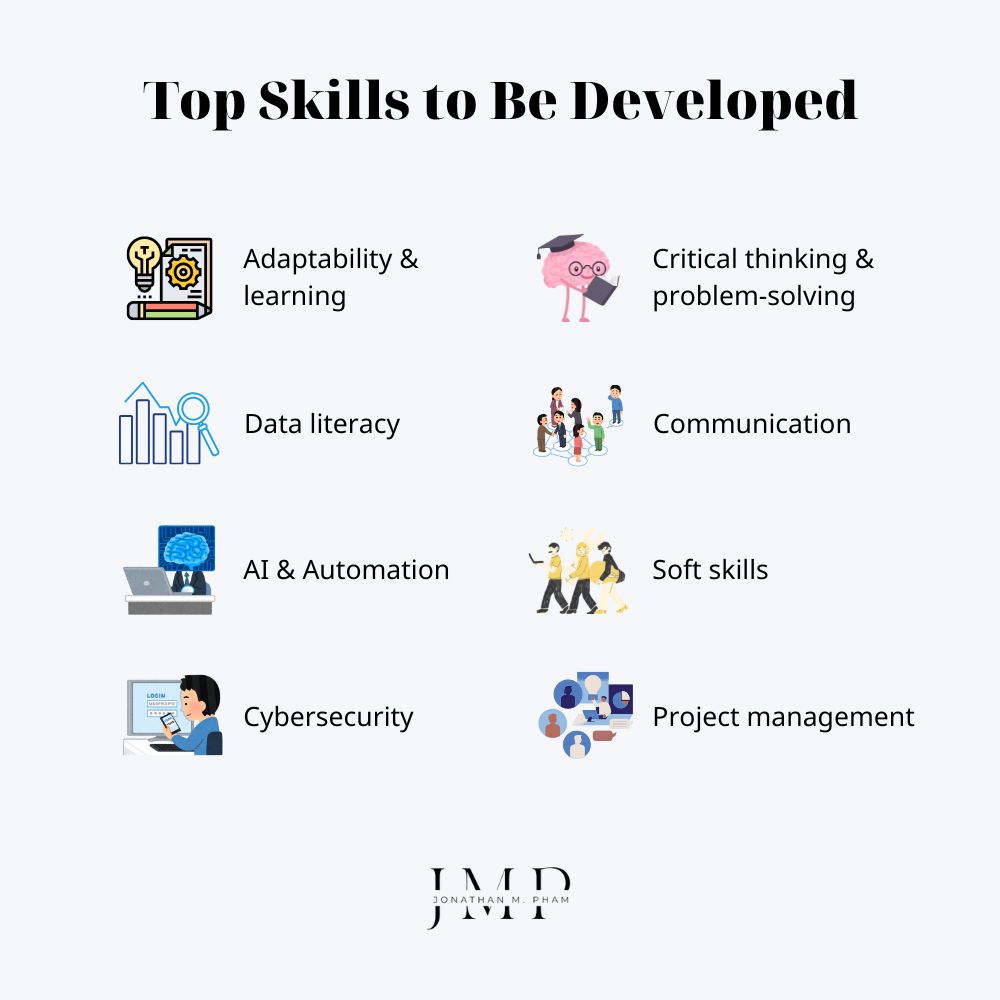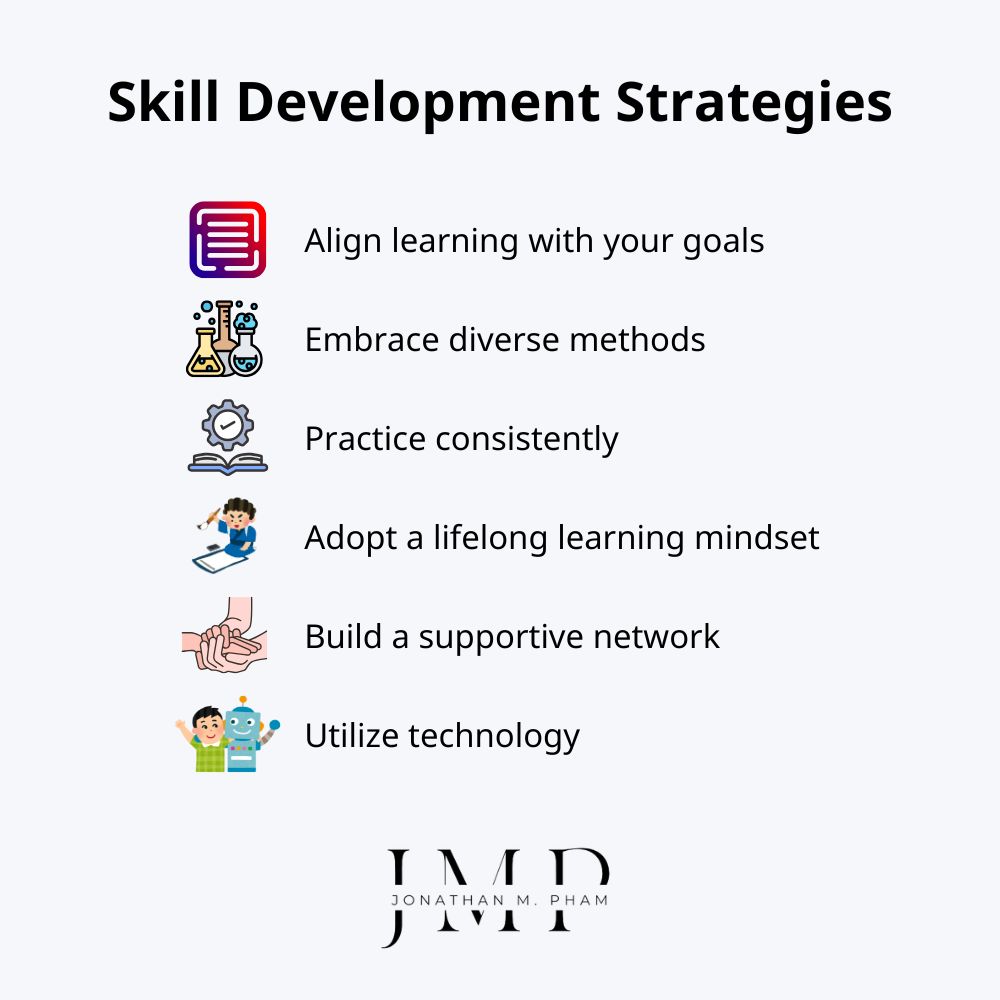Learn how to identify in-demand competencies, overcome learning challenges, and build a personalized skill development plan for the future.
The world is shifting rapidly, driven by technological advancements, globalization, and changing business needs. As such, the competencies one needs to succeed have also been evolving. Below, we will explore essential skill development strategies to future-proof one’s professional development journey and stay relevant in today’s ever-changing landscape.
Highlights
- Skill development is the continuous process of improving your abilities to succeed in your career and personal life.
- In today’s evolving workplace, top competencies include adaptability, digital literacy, AI knowledge, cybersecurity, critical thinking, communication, emotional intelligence, and project management.
- Identifying skills for development requires self-reflection, research, feedback, and planning to address challenges like time constraints and resource access.
- To effectively develop your capabilities, you need to set goals, explore diverse learning methods, practice actively, embrace lifelong learning, build a supportive network, and leverage technology.
What is Skill Development?
Skill development (also referred to by other names such as further training, professional development, vocational training, etc.) is the deliberate and continuous process of acquiring, refining, and enhancing your knowledge, competencies, and capabilities in specific areas. Its main purposes include:
- Meeting current and future work demands & fulfilling roles: Ensures that you possess the necessary expertise to not only handle your existing responsibilities effectively but also to prepare for future roles or expanded duties within your current job.
Example: A marketing professional might undertake a course in analytics to better understand campaign performance and optimize strategies, directly meeting the growing demand for data-driven marketing.
- Adapting to evolving work environments: The professional landscape is constantly changing due to technological advancements, globalization, and evolving industry trends. Skill development enables you to stay agile and relevant in the face of these changes.
- Boosting employability and achieving career aspirations: By actively working on your skillset, you significantly increase your attractiveness to potential employers and open doors to new career opportunities. It’s about making yourself more competitive in the job market and equipped to climb the career ladder or transition into a desired field.
Example: For someone aiming for a leadership role, skill development in areas like strategic thinking, team management, and conflict resolution would be invaluable.
- Support success by fostering a competent and high-performing workforce: For organizations, supporting skill development among employees is a strategic investment. It leads to a more capable and adaptable workforce, which in turn drives innovation, improves productivity, and enhances the organization’s overall success and competitiveness in the market.
- etc.

Skill development is achievable through a variety of means, including:
- Formal education programs such as university degrees, diplomas from specialized institutions, and professional certifications.
- Targeted training workshops and initiatives to impart specific competencies (like advanced Excel or project management software), often within a short timeframe.
- Immersive on-the-job experience.
- Proactive self-study (e.g. reading books, listening to podcasts, taking online courses, participating in webinars, etc.).
- Guidance from coaching and mentoring – i.e. learning from someone more experienced, whether through formal mentorship programs or informal support from a supervisor, senior colleague, or external expert.
Key Skill Development Areas
- Cognitive skills
These are the foundational mental abilities that enable us to learn, understand, and process information. Competencies such as critical thinking, problem-solving, analytical reasoning, and memory retention form the bedrock of our intellectual capacity. Working on them is like sharpening your mental toolkit, allowing you to approach challenges with clarity, make informed decisions, and adapt to new information effectively.
Example: In today’s information-rich world, critical thinking is crucial for discerning fact from fiction, evaluating different perspectives, and making sound judgments based on evidence. When facing a complex work project, strong reasoning skills enable you to break down the problem into manageable parts, analyze different solutions, and choose the most effective approach.
- Technical/ Hard skills
These refer to the specific, teachable, and measurable competencies required to perform particular tasks or jobs. These are the “know-how” skills directly related to specific industries and occupations. Examples include computer programming languages, data analysis techniques, financial accounting principles, engineering design skills, proficiency in specific software applications, or even culinary arts techniques.
- Soft skills
The interpersonal attributes, personality traits, communication abilities, social graces, and personal habits that are needed for getting along with others and successfully navigating social and professional environments. While less tangible than hard skills, they are equally vital, if not more so, for thriving in any workplace and in personal life.
Key soft skills include effective communication (both written and verbal), teamwork and collaboration, public speaking, adaptability, conflict resolution, negotiation skills, and emotional intelligence. Time management, while sometimes considered a personal skill, also heavily influences your ability to collaborate effectively with others, making it relevant here as well.
- Personal/ Self-management skills
These underpin one’s ability to navigate life’s complexities with finesse. Learning a new language not only opens doors to new cultures but also sharpens cognitive abilities. Or, incorporating mindfulness practices into daily routines aids in stress management and cultivates self-awareness, fostering emotional resilience.
Read more: Design Thinking – Reframe Thought Patterns to Unlock Innovation

Skill development topics
The Importance of Skill Development
The future belongs to those who learn more skills and combine them in creative ways.
Robert Greene
In a world characterized by rapid change and increasing complexity, skill development is not merely beneficial – it’s indispensable for personal and professional success, as well as overall well-being. This is particularly evident during times of crisis (e.g. losing a job), where the ability to adapt and cultivate new competencies can be a lifeline.
One of our readers shared this story: when he lost his job during the worst time of mass layoffs of 2023-2024, he quickly launched a blog and a marketing business called RetainTrust. Although it didn’t generate income at first, it helped him reconnect with former colleagues, meet new people, learn new skills like WordPress development and web design, and ultimately led to new clients and a full-time job opportunity.
- Amplified employability
By actively mastering new competencies and refining existing ones, you significantly expand your career options and make yourself a far more attractive candidate to potential employers. In essence, it is about future-proofing your career from the outset.
Example: Consider two recent graduates applying for a digital marketing position. One has a general marketing degree. The other, in addition to a similar degree, has proactively acquired certifications in Google Analytics, SEO optimization, and social media marketing tools through online courses. The second graduate, demonstrably equipped with specific and current digital marketing skills, will undoubtedly be the more sought-after candidate.
- Accelerated career progression
Continuous learning and skill enhancement equip you with the advanced knowledge, specialized expertise, and broader capabilities needed to perform at a higher level and confidently undertake more challenging responsibilities. This directly translates into improved performance in your current role, making you eligible for promotions, leadership positions, and more complex and rewarding projects.
- Enhanced personal fulfillment
The journey of learning new things is intrinsically rewarding. It keeps you intellectually stimulated, engaged, and curious. Skill development opens doors to new opportunities, experiences, and perspectives, broadening your horizons both professionally and personally. As you overcome learning curves and master new abilities, it contributes to a profound sense of accomplishment, significantly boosting your confidence and self-esteem.
Read more: Fulfillment in Life – How to Find Meaning & Passion Every Day
- Adaptability and future-proofing
The modern world of work is characterized by constant evolution, driven by technological advancements, globalization, and shifting industry paradigms. By staying abreast of emerging trends, understanding new technologies, and continuously upskilling, you are far better equipped to adapt to change, remain relevant in the long run, and future-proof your career against obsolescence.
Example: The rapid rise of Artificial Intelligence (AI) and automation is transforming numerous industries. Professionals who proactively cultivate skills in areas like AI, machine learning, data science, or even in managing human-AI collaboration are future-proofing their careers. They are positioned to not only survive but thrive in a job market increasingly influenced by these technologies, while those who fail to adapt risk being left behind.
Survival in business requires a synergy of skills.
Richard Branson
- Holistic well-being
The pursuit of knowledge and new abilities stimulates intellectual curiosity, keeps your mind sharp, and can prevent cognitive decline. Additionally, it also gives rise to new hobbies and interests, providing avenues for relaxation, creativity, and personal enjoyment, thus reducing stress and improving mental health.
Many forms of skill development, particularly soft skills, enhance social connections and communication abilities, fostering stronger relationships and a greater sense of belonging, all contributing to a more balanced and flourishing life.
Example: Learning a new language can open doors to new cultures, travel experiences, and connections with people from different backgrounds, enriching social well-being.

Skill development benefits
Types of Skill Development
By purpose:
- Upskilling: Acquiring new competencies to advance in your current career or take on new responsibilities. According to a study by LMS, 63% of respondents agree that upskilling will become more important than ever, given the AI-driven future that is about to come.
- Reskilling: Learning new things due to technological change or career shifts.
- Cross-skilling: Acquiring skills from different disciplines to become more versatile and adaptable.
- New skilling: Preparing for a completely new career path.
- Maintenance skilling: Regularly practicing and staying updated on existing competencies.
By approach:
- Formal learning: Attending courses, workshops, or degree programs.
- Informal learning: On-the-job training, mentoring, self-study, or online resources.
- Experiential learning: Learning through active participation in projects, simulations, or real-world experiences.
- Social learning: Acquiring knowledge through observation, collaboration, and feedback from others.
- Microlearning: Breaking down learning into small, bite-sized chunks for easy absorption.
- Blended learning: Combining different methods (e.g., online courses, workshops, group projects) for a richer experience.
Top Skills to Be Developed in Today’s Landscape
Success is 20% skills and 80% strategy. You might know how to read, but more importantly, what’s your plan to read?
Jim Rohn
Adaptability & continuous learning
With the relentless pace of technological advancements and constantly shifting market dynamics, the ability to learn new things quickly, embrace change, and adapt to evolving circumstances has become paramount. This goes beyond simply learning a new skill once – it’s about cultivating a growth mindset and a commitment to lifelong learning.
To facilitate this continuous skill enhancement, microlearning – breaking down information into small, digestible chunks – has emerged as a highly effective and popular strategy, allowing for learning in short bursts and easily integrating into busy schedules.
Read more: 30 Growth Mindset Questions for Everyone – Empowerment through Inquiry
Digital & data literacy
In an era profoundly shaped by AI, automation, and data, digital and data literacy are no longer optional – they are foundational competencies. Understanding digital tools, platforms, and online environments is indispensable for effective communication, collaboration, and accessing information.
Furthermore, the ability to not just collect but to comprehend, interpret, and critically evaluate data is increasingly vital across diverse industries and roles. This includes understanding data privacy, security, and ethical considerations in the digital realm.
Example: Think about a teacher who needs to transition to online teaching. Digital literacy is crucial for using learning management systems, creating engaging online content, and facilitating virtual classrooms. Data literacy becomes important when they analyze student performance data to tailor their teaching methods effectively.
Artificial Intelligence (AI) & Automation
While becoming an AI expert isn’t necessary for everyone, a foundational familiarity with machine learning technologies and automation is increasingly essential for professionals across virtually all sectors. Understanding how AI and automation are transforming industries, and what opportunities and challenges they present, is crucial for strategic career planning.
While technical skills like coding, programming, data science, and engineering remain highly valuable for those directly building and implementing AI systems, even non-technical roles will benefit from understanding AI’s capabilities and limitations, and how to work alongside AI-powered tools.
Example: A journalist doesn’t need to be a programmer, but knowing how AI algorithms curate news feeds and analyze data can help them critically evaluate information sources and potentially improve the ability to do research.
Cybersecurity knowledge
Every individual, regardless of their role, likely handles sensitive data, whether it’s customer information, financial records, or intellectual property. Knowing how to create strong passwords, recognize phishing attempts, use secure networks, and understand basic data protection principles are fundamental competencies for everyone.
Critical thinking & problem-solving
Skills such as identifying bias, evaluating evidence from diverse sources, and finding creative resolutions to intricate challenges are indispensable for navigating today’s dynamic, ambiguous, and often overwhelming environment. Automation can handle routine tasks, but critical thinking and problem-solving are essential for tackling novel, ill-defined, and complex issues.
In a world overloaded with information, the ability to reason also becomes crucial for discerning credible sources, identifying misinformation, and making sound judgments based on evidence rather than assumptions or biases.
Communication & collaboration
Mastery of active listening, clear and concise communication (both verbal and written), and proficiency in virtual collaboration tools is increasingly essential, particularly in today’s increasingly distributed and remote work environments. These skills bridge geographical divides, foster understanding, and enable teams to work synergistically towards shared goals.
Soft skills & emotional intelligence
As technology increasingly automates routine and transactional tasks, distinctly human competencies like empathy, leadership, interpersonal skills, and teamwork are gaining even greater prominence and are increasingly what distinguish high-performing individuals and teams. Emotional intelligence (EQ), which involves understanding and effectively managing your own emotions, recognizing and influencing those of others, is crucial for fostering strong relationships, building trust, navigating interpersonal dynamics, and leading with compassion.
Read more: 35 Emotional Intelligence Questions to Attain Self-mastery
Project management
Imagine a marketing team launching a new product campaign. Project management skills are essential for planning the various stages of the campaign, delegating tasks to team members (content creation, social media promotion, advertising, etc.), managing the budget, tracking deadlines, and ensuring all components come together smoothly for a successful launch.
Even in personal life, such skills can be applied to organize a complex event like planning a wedding or managing a home renovation, bringing structure and efficiency to large, multi-faceted endeavors.
Even in such technical lines as engineering, about 15% of one’s financial success is due one’s technical knowledge and about 85% is due to skill in human engineering, to personality and the ability to lead people.
Dale Carnegie

How to Identify Skills for Development
Build your skills, not your resume.
Sheryl Sandberg
Identifying skills for development is a crucial first step in your journey toward improvement.
- Self-assessment:
- Reflect on your strengths and weaknesses: Consider what you’re good at and what areas you find challenging.
- Define personal goals: What do you want to achieve in your personal life? Are there competencies that would make you more confident, productive, or fulfilled?
- Think about your career goals: Where do you want to be in 5 or 10 years? What will you need to get there? What skills do you need to advance, change careers, or start a new business? To answer these questions, it is recommended that you analyze job descriptions and industry trends for your target careers.
- Assess your current job satisfaction: Are you feeling unchallenged or lacking opportunities to use your skills? What qualities could improve your performance and job satisfaction?
- Research & exploration:
- Review job requirements: Look at a job description and identify the essential skills listed. Consider any upcoming projects or changes that might require additional competencies.
- Identify in-demand skills: Research job postings, industry reports, and the future of work trends to see what skills are highly sought after.
- Look for learning resources and opportunities: What resources and training are available to you to develop specific competencies?
- Commit your time: How much time are you realistically able to dedicate to skill development?
- Leverage personal motivation: Choose skills you find genuinely interesting and motivating to sustain the learning journey.
- Feedback & external input:
- Seek feedback from trusted sources: Don’t be afraid to reach out for help. Ask colleagues, mentors, or professionals in your field for their honest opinion of your strengths and areas for improvement.
- Take assessments: Online tests or professional assessments can provide a more objective perspective on your skill level in specific areas (as well as the gaps to be addressed).
- Personality tests: Understanding your personality type through frameworks like the DISC can give insights into your strengths and learning preferences.
Without Knowledge, Skill cannot be focused. Without Skill, Strength cannot be brought to bear and without Strength, Knowledge may not be applied.
Alexander the Great

How to build a skill development plan: Start by understanding yourself
Read more: 200 Self-reflection Questions – Toolkit for Life Pilgrims
Challenges of Skill Development
- Identifying the right skills
The abundance of resources and opinions these days makes it confusing for a lot of us when it comes to selecting the most relevant competencies to work on. Moreover, keeping abreast of rapidly evolving technologies and industries also poses a significant challenge – especially for the previous generations.
Not to mention, our innate tendency to overestimate strengths and underestimate weaknesses further complicates the process, making it difficult to objectively identify areas for improvement.
- Overcoming procrastination & time barriers
Balancing competing priorities such as work, personal life, and skill development often leads to procrastination and disrupted learning plans. Sustaining motivation, especially in the face of initial setbacks, proves challenging for many of us – who often find themselves struggling to find dedicated time for learning amidst busy schedules.
- Accessing resources & support
High-quality training programs and resources may not be readily accessible to everyone – and even for those who have access to them, the plethora of learning methods available just makes things complicated.
Furthermore, the absence of encouragement and guidance from peers, mentors, or colleagues is also another factor that hampers progress and accountability.
- Putting skills into practice
Translating acquired skills into real-world applications necessitates practice and adaptation. However, our fear of failure – as well as limited opportunities within current roles – often inhibits the efforts to utilize newly developed competencies.
- Maintaining continuous learning
The perpetual evolution of skills demands ongoing learning and adaptation, which can be draining for many people. Integrating skill development into daily life without neglecting other obligations requires diligent effort to sustain motivation and seek challenges for growth.
Overcoming these hurdles requires a proactive and tailored approach. By acknowledging individual challenges, seeking support from peers and mentors, and implementing effective learning strategies, one may navigate the complexities of skill development with greater efficacy.
Don’t wish it were easier. Wish you were better.
Jim Rohn

Read more: 10x Thinking – Elevate Your Success to New Heights
Skill Development Strategies & Best Practices
Nobody ever mastered any skill except through intensive persistent and intelligent practice.
Norman Vincent Peale
Below are some tips for individuals to consider applying to their professional development journey.
Align learning with your goals
You should prioritize developing skills based on their direct relevance to your career aspirations, your current role’s evolving needs, and even your personal growth objectives. This means taking a deliberate approach to skill selection rather than randomly chasing trends.
A truly strong skillset is not just about technical expertise; it also encompasses crucial competencies like communication, teamwork, adaptability, and emotional intelligence.
Actionable steps:
- Define clear goals: Where do you want to be in 1 year, 3 years, 5 years? What areas of your life do you want to enrich or improve?
- Needs assessment: What skills are essential for your desired roles or personal aspirations? Where are the gaps? Seek feedback from supervisors, mentors, or colleagues to gain a more objective perspective.
- Prioritize based on relevance and impact: Focus on developing skills that will have the most significant impact on achieving your goals, both in the short and long term. Use a matrix or similar tool to rank potential competencies based on their importance and urgency.
- Break down large goals: To avoid feeling overwhelmed by the sheer scale of skill development, break down large, ambitious goals into smaller, manageable steps. For example, instead of “become a data science expert,” start with “complete an introductory Python course for data analysis.”
- Create personalized learning plans: Schedule dedicated learning time into your calendar, treating it as you would any important appointment. This creates structure and promotes consistent progress, directly addressing the challenge of procrastination and time barriers.
Read more: Life Management – How to Design a Life You Love
Embrace diverse methods
Are you primarily a visual learner (preferring diagrams, videos), auditory learner (lectures, discussions), or kinesthetic learner (hands-on activities, practice)? Tailor your learning methods to align with your preferred style for optimal engagement and deeper absorption of information.
Actionable steps:
- Identify your learning style: Reflect on past learning experiences. What methods have you found most effective and enjoyable? Online quizzes and learning style assessments can also provide insights.
- Explore a range of resources: Don’t limit yourself to one type of learning resource. Instead, actively seek out a mix of online courses (platforms like Coursera, Udemy, edX), interactive workshops (both online and in-person), insightful books and articles, engaging podcasts, and practical mentorship experiences.
- Combine learning approaches for a well-rounded experience: For instance, you can complement online course learning with hands-on projects, or follow up workshop sessions with mentorship guidance. This multi-faceted approach helps solidify understanding and provides varied perspectives.
- Prioritize quality over quantity: Focus on selecting high-quality resources and experiences that offer valuable insights, practical applications, and reputable sources. Read reviews, check credentials, and seek recommendations to ensure you invest your time wisely.
Practice consistently
To move beyond simply passively consuming information and to attain genuine self-mastery, it’s crucial to engage actively with the learning material and practice consistently. This means moving beyond reading or watching to actively applying what you learn through exercises, participating in discussions, and undertaking real-world projects whenever possible.
To combat procrastination and maintain motivation, inject enjoyment into your learning process by selecting topics that genuinely pique your personal interest and choosing interactive learning methods that keep you engaged and energized.
Actionable steps:
- Active recall and spaced repetition: Instead of just re-reading material, actively test yourself on what you’ve learned using techniques like flashcards or practice quizzes. Implement spaced repetition to review material at increasing intervals to enhance long-term memory and retention.
- Hands-on projects and real-world application: Look for opportunities to immediately apply your newly acquired skills in practical projects, even if they are small-scale or personal projects initially. This “learning by doing” approach solidifies knowledge and builds confidence in real-world scenarios.
- Seek constructive feedback: Constructive criticism from peers, mentors, or instructors is invaluable for identifying areas for improvement and refining your skills.
- Make learning fun and engaging: If you find yourself bored or unmotivated, experiment with different formats, topics, or learning communities until you find something that sparks your interest and keeps you engaged.
Repetition is the mother of skills.
Tony Robbins
Adopt a lifelong learning mindset
Skill development is an ongoing process that requires continuous improvement. As such, you should stay updated on industry trends and emerging technologies to remain relevant in the field.
Actionable steps:
- Cultivate curiosity: Approach new information and challenges with an open and inquisitive mind. Ask “why” and “how” questions, and actively seek out new knowledge.
- Regularly reflect on yourself: Periodically assess your skillset against current and future demands. Identify emerging competencies that are becoming increasingly important in your industry or area of interest.
- Allocate time for continuous learning: Just as you schedule time for work and personal commitments, try to consciously allocate dedicated time each week or month for activities such as reading industry publications, taking online mini-courses, or attending webinars.
Build a supportive network
It is recommended that you surround yourself with like-minded individuals – while seeking guidance from experienced professionals. Networking with peers, joining communities, and seeking mentorship opportunities (whether on your own or by leveraging your employer’s resources) all offer invaluable sources for receiving support and feedback. In addition, partnering with a learning buddy or accountability partner is also a good option to enhance motivation and share learning experiences.
Utilize technology
Online learning platforms provide convenient access to a wealth of resources and personalized learning experiences. Consider employing productivity tools for time management, organization, and progress tracking to enhance efficiency. On top of that, stay connected with the latest trends through industry publications and online discussions, so as to facilitate continuous learning and professional development.

How to improve skill development
Skill Development Plan Example & Template
Here’s an example of a skill development plan you may adapt for your own needs:
Name: John Doe
Occupation: Marketing Specialist
Career Goal: Become a Marketing Manager within 2 years
Skill Area: Digital Marketing Analytics
Strengths: Strong understanding of basic marketing concepts, and experience with social media advertising.
Weaknesses: Limited knowledge of advanced analytics tools, and difficulty interpreting complex data sets.
Goal: Develop proficiency in using Google Analytics and create data-driven marketing campaigns.
Timeline: 6 months
Action Steps:
- Month 1: Complete online course on Google Analytics fundamentals.
- Month 2: Apply learnings to analyze personal social media marketing performance.
- Month 3: Join an online community or forum for Google Analytics users.
- Month 4: Take a more advanced course on marketing data analysis.
- Month 5: Shadow the company’s data analyst and learn from their expertise.
- Month 6: Present a data-driven marketing campaign proposal to my manager.
Resources:
- Google Analytics Academy courses.
- Udemy/Coursera data analytics courses.
- Online communities: Reddit’s r/GoogleAnalytics, Facebook groups.
- Company mentorship program.
Evaluation:
- How will you track your progress? => Through course completion certificates, personal project results, and feedback from a mentor.
- When will you reassess your learning? => At the end of 6 months.
- How will you adapt your plan if needed? => Based on progress and learning experiences.

Knowledge and skill development for work
Skill Development Activities & Exercises
Individuals:
- Self-assessment tools and quizzes: Identify strengths, weaknesses, and areas for improvement. (e.g., Myers-Briggs, StrengthsFinder).
- Online courses and tutorials: Learn new skills at your own pace on various platforms. (e.g., Coursera, Udemy).
- Mentorship programs: Gain guidance and insights from experienced professionals.
- Shadowing: Observe and learn from others in your desired field.
- Challenge projects: Take on new tasks or projects to apply and develop your skills.
- Network with like-minded individuals: Share experiences and learn from others’ journeys.
- Books and articles: Expand your knowledge and gain new perspectives.
- Skill-building apps and games: Make learning fun and engaging.
- Practice and reflection: Regularly apply your newly learned competencies and reflect on your progress.
Teams:
- Team-building activities: Foster collaboration, communication, and problem-solving. (e.g., Escape rooms, scavenger hunts).
- Cross-training: Team members learn each other’s skills and become more versatile.
- Knowledge-sharing sessions: Team members present their expertise to others.
- Collaborative projects: Work together on a common goal to develop skills and teamwork.
- Peer feedback and coaching: Provide constructive feedback and support to colleagues.
- Role-playing exercises: Practice real-world scenarios to hone communication and problem-solving skills.
- Case studies and simulations: Analyze real-world challenges and develop solutions together.
- Team retreats and workshops: Focus on specific skill development and team bonding.
Skill Development Quotes
Check out a full list of skill development quotes here!
Skills are never taught, they are acquired. I can give you a camera, but can’t feed your vision.
Raghu Rai
The more we give importance to skill development, the more competent will be our youth.
Narendra Modi
You can cut down a tree with a hammer, but it takes about 30 days. If you trade the hammer for an ax, you can cut it down in about 30 minutes. The difference between 30 days and 30 minutes is skills.
Jim Rohn
Practice is just as valuable as a sale. The sale will make you a living; the skill will make you a fortune.
Jim Rohn
Skill is the unified force of experience, intellect and passion in their operation.
John Ruskin
My best skill was that I was coachable. I was a sponge and aggressive to learn.
Michael Jordan
Resources for Skill Development
Books
- The Success Principles by Jack Canfield: Introduces 65 methods for transforming your life and achieving your goals, based on the principles of successful people from different fields and backgrounds.
- The Talent Code by Daniel Coyle: Explores the concept of talent and how it can be cultivated through deep and deliberate practice, motivation, and coaching.
- Atomic Habits by James Clear: A practical guide on how to change your habits and get 1% better every day – by utilizing the Four Laws of Behavior Change (make it obvious, make it attractive, make it easy, and make it satisfying).
- Peak by K. Anders Ericsson and Robert Pool: Reveals the secrets of the new science of expertise, based on decades of research by the author and other psychologists. According to the authors, anyone can improve their abilities with deliberate practice – which involves setting specific goals, getting feedback, and focusing on the areas that need improvement.
- Leadership – Theory, Application, & Skill Development by Christopher F. Achua and Robert N. Lussier: A comprehensive and engaging introduction to leadership theories, which covers traditional and cutting-edge topics such as traits, ethics, behavior, motivation, contingency, communication, coaching, conflict, power, politics, change, crisis, charisma, transformation, culture, diversity, and strategy.
Quizzes/ Questionnaires
- Empowered and Thriving – Free Personal Development Quizzes.
- SHRM Quiz – Test Your Knowledge of Learning and Development.
- Quizack – General Skill Development (for Professionals) MCQs.
- ProProfs Quiz – What Skills Do I Have?
Software
- Pluralsight – Technology skills for business.
- Udacity.
Read more: Habits in Personality Development – A Comprehensive Guide

Other resources you might be interested in:
- Self Discovery: An Expedition to the Core
- 250 Bucket List Ideas: Dream, Explore, Achieve
- 28 Motivational Success Stories: Making the Impossible Possible
Let’s Tread the Path Together, Shall We?


